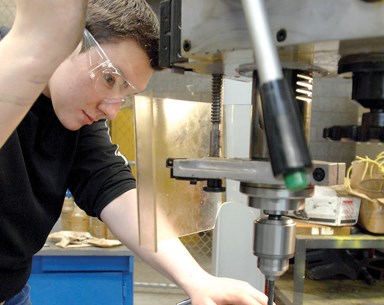High school student Kole McCarron likes the idea of fixing cars for a living and jumped at the chance to test drive the automotive and auto body shops Friday on Trades Day at the College of New Caledonia.
If he follows through on his plan and goes on to become a journeyman mechanic once he finishes his Grade 12 studies at Prince George secondary school, he knows the chances are good he won't have any trouble finding a lifetime occupation -- one that offers healthy wages.
"My uncle [Brutus McCarron] is a mechanic and he has a really nice house," smiled McCarron. "I don't know why, but ever since I was a little kid I've had a fascination with cars and this is what I want to do with my life. Right now, people are starting to retire in automotives, so once I'm through this I probably will have a job waiting for me."
Jaden Bester's mom is a crane operator and her dad is a commercial transport mechanic and ever since she was a little girl she's been hardwired for a career as a mechanic. After three years of auto shop at D.P. Todd secondary school, the Grade 12 student is looking forward to September, when she begins the 30-week automotives technology program at CNC.
"I just love tinkering, I started off with Logo blocks and Tonka trucks, and we have an incredible automotives program at D.P. Todd," said Bester. "Most schools don't get to start tinkering on vehicles until Grade 12; we started in Grade 11 with basic car maintenance and then by Grade 12 we were pulled apart an entire engine and did the specs and put it back together.
"I've been around this my whole life and there's always a job for a mechanic. There will always be things that break and need to be fixed. Everything has a [limited] life so you will always have a job."
Sixty-eight students from high schools and the college's Career and Technical Centre (CTC) tried their hands Friday in exploring CNC's trades programs, which include carpentry, electrical, automotive, auto body, plumbing, welding, heavy duty mechanics, industrial machinist (millwright), power engineering, and commercial transport programs.
Restoring old cars is Laura Wilson's passion and one of the first projects she has in mind is refinishing the body of her 1974 Toyota Corona, while her dream is to put a showroom finish on a 1953 DeSoto Firedome. The 20-year-old Wilson started honing her craft in CNC's 30-week motor vehicle body repair foundation program in November. She hopes to get a job in a local body shop after she graduates and then go back to school to specialize in paint work and refinishing.
"Everybody crashes and gets into fender-benders so you'll never be out of work," said Wilson.
"It's a really good career to get into. For me, it's all about the painting. Nothing makes me happier than when you just paint a car and put a coat of wax in it, that's my paradise. It's really rewarding."
Now in its second year, the auto body program is operating at peak capacity with 16 students. CNC is the only post-secondary school in northern B.C. now training auto body mechanics. Each student who graduates receives credit for 625 hours of shop time which counts toward the vehicle body repairer apprenticeship program.
Auto body became a full-time program at CNC late in 2011 and the industry has shown its support by providing five $1,000 scholarships for students each semester. Students who want to finish off their formal training have to go to a school like BCIT for two years but CNC is trying to find a way to expand the program to keep its apprentices in Prince George.
"There is no other auto body training in the north, the only other place that offers this is in the Lower Mainland or Okanagan," said CNC auto body instructor Byron Hayashi.
"We have a brand-new building and brand-new equipment with state-of-the-art supplies and materials. One thing about being an auto body mechanic is you have to know a little bit about every trade. You have to know a little about electricity, welding, a lot about mechanics, even plumbing, and you have to have an artistic flare, especially when you get into painting."
While there's been emphasis lately on training more tradespeople for resource-based industries, Hayashi said work in those trades is often based on market conditions that rise and fall with the economy and that problem doesn't exist in the auto body trade. He said a trained mechanic is always in demand and those skills can be applied virtually anywhere.
"Every shop is always looking for skilled personnel and if you have the training and the right attitude, you'll find employment," he said. "Cars are coming out with all these fancy materials and safety features and you have to go to school to learn how to do this stuff. Training is the future."



